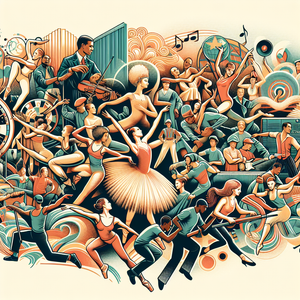
Exploring Dynamic Career Paths: Opportunities with a Dance Degree
A dance degree opens doors to a myriad of exciting career opportunities that extend beyond the traditional roles of performer or choreographer. Graduates can explore diverse fields such as arts administration, dance therapy, and education, among others. Research shows that there are over 20 potential career paths available to dance degree holders, reflecting the multifaceted nature of the profession. While many discussions center around performance and teaching, the administrative and therapeutic aspects of dance are equally vital. For instance, dance therapy combines artistic expression with psychological healing, while arts administration focuses on the management side of the dance world. This variety illustrates the changing landscape of the arts and highlights the growing need for professionals who bridge dance with community, health, and business initiatives. As the dance industry evolves, so too do the avenues for graduates to forge meaningful careers in a range of settings.
Job Summaries:
Dancer:
- Dancers engage in performances across various platforms, from theater to concert stages.
- This profession requires rigorous training in diverse dance styles and exceptional physical conditioning.
- Dancers actively audition for roles and rehearse regularly, often collaborating with choreographers to enhance their performances.
- Holding a dance degree significantly boosts opportunities in this competitive field, especially when combined with networking and hands-on experience.
- Aspiring dancers are encouraged to actively seek auditions and performance opportunities to kickstart their careers.
Choreographer:
- Choreographers are the artistic visionaries behind dance routines for performances, music videos, and competitions.
- They must blend creativity with effective communication to translate their ideas into movement.
- Collaborating with directors and producers is crucial to ensure that the choreography aligns with the overarching vision of the production.
- A solid foundation in dance, paired with experience in performance and teaching, is typically essential.
- Choreographers play a key role in shaping the evolution of dance styles.
Dance Teacher:
- Dance teachers instruct students in various styles, from ballet to contemporary dance.
- They work in environments such as private studios, schools, or community centers.
- Dance teachers develop lesson plans and teach techniques.
- They prepare students for performances and competitions.
- A dance degree is often required for this role.
- Passion for education and strong interpersonal skills are essential.
- Dance teachers nurture the skills and confidence of future dancers.
Dance Therapist:
- Dance therapists employ movement as a therapeutic tool to foster emotional, cognitive, and social integration.
- This specialized role demands a deep understanding of dance, psychology, and therapeutic practices.
- Working in settings such as hospitals, schools, or community programs, dance therapists help individuals use movement for healing and self-expression.
- Typically, a master's degree in dance therapy or a related field, along with certification, is required.
- This career path highlights the significant impact dance can have on mental health.
Arts Administrator:
- Arts administrators oversee the business operations of dance organizations, including budgeting, marketing, and event planning.
- They ensure that dance companies and schools run smoothly while promoting their mission and objectives.
- Strong organizational and communication skills are vital, as is a background in arts management or business.
- This role is essential for sustaining the arts and enhancing community engagement through dance.
Dance Notator:
- Dance notators play a crucial role in documenting choreography through specialized notation systems.
- They preserve dance works and create instructional materials.
- A comprehensive understanding of dance and notation methods like Benesh or Labanotation is necessary.
- Collaborating with choreographers and dance companies ensures the accuracy of performances.
- This collaboration also facilitates teaching.
- This profession underscores the importance of documentation within the dance field.
Stage Manager:
- Stage managers are the backbone of any production, coordinating all aspects to guarantee smooth performances.
- Their responsibilities include scheduling rehearsals, managing props and costumes, and maintaining communication with the cast and crew.
- A background in theater or dance, coupled with strong organizational skills and attention to detail, is crucial.
- Stage managers are vital to the success of performances, adeptly handling logistics and troubleshooting on the fly.
Costume Designer:
- Costume designers create attire that aligns with the theme and character of a dance production.
- This role involves researching, sketching designs, and collaborating closely with choreographers and directors.
- A background in fashion design or theater arts, along with creativity and meticulous attention to detail, is essential.
- Costume designers enhance the visual narrative of dance, making their contributions integral to the overall production.
Dance Videographer:
- Dance videographers capture performances on film.
- They create promotional content and documentation for companies and choreographers.
- A keen eye for movement and composition is necessary.
- Technical skills in video editing and production are necessary.
- A background in film or media studies can be advantageous.
- Experience in dance can be advantageous.
- This role is increasingly important as digital media becomes more intertwined with the dance industry.
Artistic Director:
- Artistic directors shape the creative vision of dance companies.
- They select repertoire and guide the artistic direction of productions.
- This role requires strong leadership skills and a profound understanding of dance.
- A background in performance or choreography is often essential.
- Experience in arts administration is often essential.
- Artistic directors influence the identity of a dance organization.
- They impact the organization's role within the community and the broader art form.
A dance degree presents a wealth of career possibilities that go beyond traditional roles. By embracing the versatility of a dance education, graduates can uncover fulfilling positions that align with their interests and skills. The arts are continuously evolving, creating new opportunities for dance professionals, making this an exciting time to pursue a career in this dynamic field. With the right education, networking, and experience, the possibilities for those ready to step into their future are truly limitless.
Explore More Jobs

